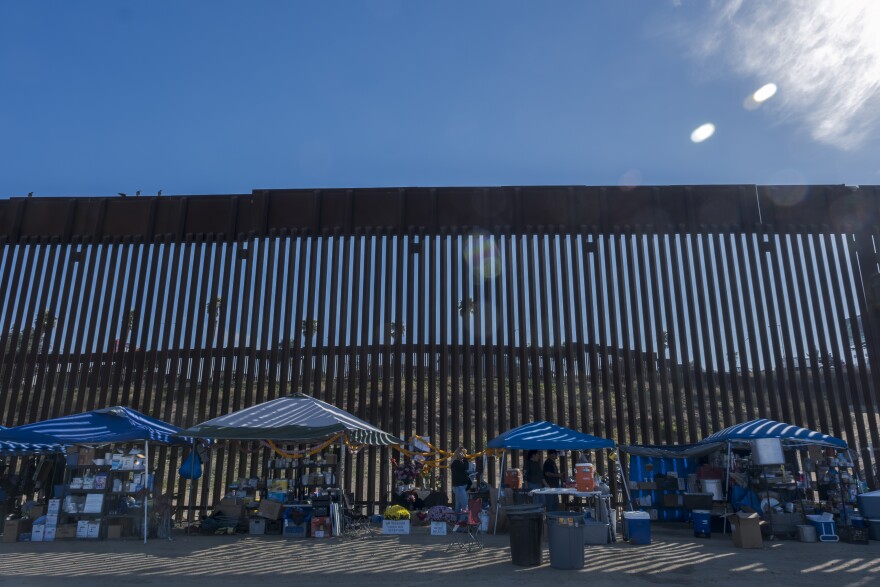It has been 12 days since a 29-year-old Guinean woman died in Customs and Border Protection’s (CBP) makeshift migrant camp in San Ysidro.
Since then, conditions haven’t improved. CBP personnel continue to tell migrants to wait in open-air camps so they can be processed to enter the United States.
“I really believe that another person will die unless there is a substantial change to these conditions,” said Erika Pinheiro, executive director of Al Otro Lado. The nonprofit is one of several providing humanitarian aid to the San Ysidro camp and another in Jacumba.
Conditions at these camps — which offer no protection from the outside elements and offer few medical services — have not changed since the woman’s death, she added.
“The open-air detention sites in Jacumba have continued to grow,” Pinheiro said. “We have not seen Border Patrol regularly hand out water, we’ve still had to call 911 multiple times a day for very serious medical emergencies. Nothing has changed.”
Border Kindness, Universidad Popular and American Friends Service Committee are other organizations providing aid.
The woman crossed the border illegally with a group of about 100 people at around 5:15 a.m. on Oct. 11. The group turned themselves in to Border Patrol agents, who then sorted them into smaller groups, according to CBP.
Around 5:40 a.m., agents noticed that the 29-year-old woman appeared winded. They offered an ambulance, but she declined.
Humanitarian workers have previously told KPBS that it’s common for migrants to decline ambulance rides because it often leads to family separation — especially if they travel in big groups, because only two people can ride in an ambulance. The woman traveled with a relative and a friend.
Around 5:45 a.m., the woman was unresponsive. Agents could not find her pulse and performed chest compressions until an ambulance arrived. She arrived at Scripps Mercy Chula Vista at 6:17 a.m. and was declared dead at 7:10 a.m., according to CBP.
The cause and manner of death is still under investigation. The Department of Homeland Security’s Office of Professional Responsibility is reviewing the incident.
CBP has been using outdoor areas in Jacumba and San Ysidro as temporary waiting areas since fall 2022. Migrants are told to stay in the camps if they want to be processed to enter the country and pursue asylum claims.
The public became aware of these camps following news reports in May of this year. At the time, there was an influx in illegal migration and hundreds of migrants lived in these camps.
After public backlash and inquiries from several members of Congress, including Rep. Juan Vargas, D-CA 52, CBP stopped using the camps.
But the camps reemerged in September amid another influx of illegal migration.
From the beginning, humanitarian workers had warned that it was only a matter of time before someone died because of the camps’ poor conditions.
Humanitarian workers like Pinheiro are frustrated by the lack of local leadership on this issue.

Neither the city of San Diego nor San Diego County have allocated funding to help nonprofits provide food, water, clothes and medical aid to migrants in the camps. All of that work is being done by volunteers and paid for by donations.
County officials did approve $3 million to support nonprofits helping migrants dropped off in San Diego.
But San Diego’s elected officials have not issued statements condemning the migrant woman’s death or publicly pressured CBP to improve conditions.
“The city, county, state and federal government all point fingers at each other to absolve themselves of responsibility for these migrants who are coming to seek protection on our soil and what ends up happening is that no one takes responsibility and it’s the migrants themselves who suffer,” Pinheiro said.
Vargas was not available for an interview. His spokesperson said Vargas is aware of the situation and is in touch with federal officials on the matter.
“Congressman Vargas has heard varying accounts of what happened at the border with the young woman from Guinea and has asked DHS for a full accounting of the facts to determine exactly what transpired,” the spokesperson said.
San Diego Mayor Todd Gloria and County Supervisor Nora Vargas did not respond to questions.
San Diego City Councilmember Vivian Moreno, whose district includes San Ysidro, was not available for an interview. But she issued a statement pointing blame at the federal government.
“The federal government’s current system for dealing with asylum seekers is inhumane, and my heart goes out to the family of the woman who passed away,” she wrote. “Migrants should not be detained outside for prolonged periods of time between the two borders fences.”
The federal government needs to build a system to receive and process migrants that is both effective and humane, she added.







